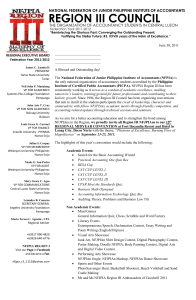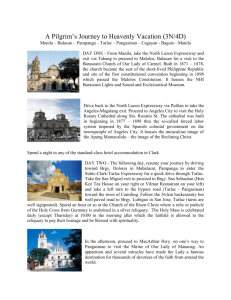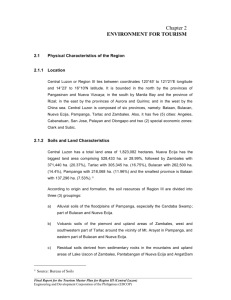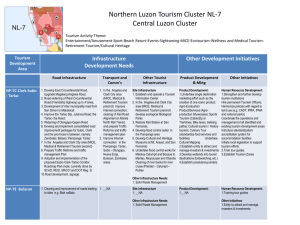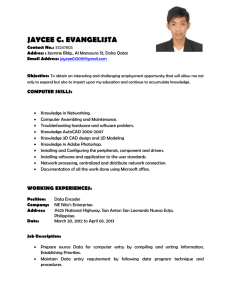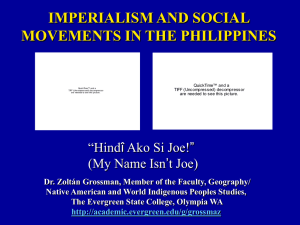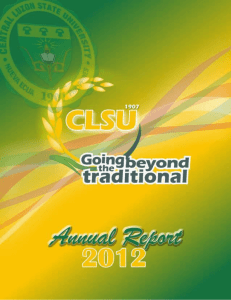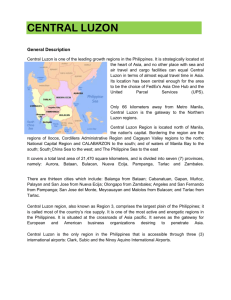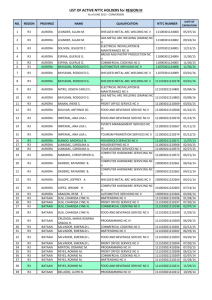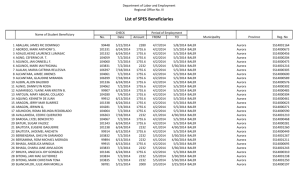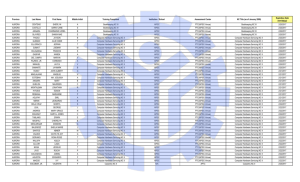Chapter 6 - Facilities and Services
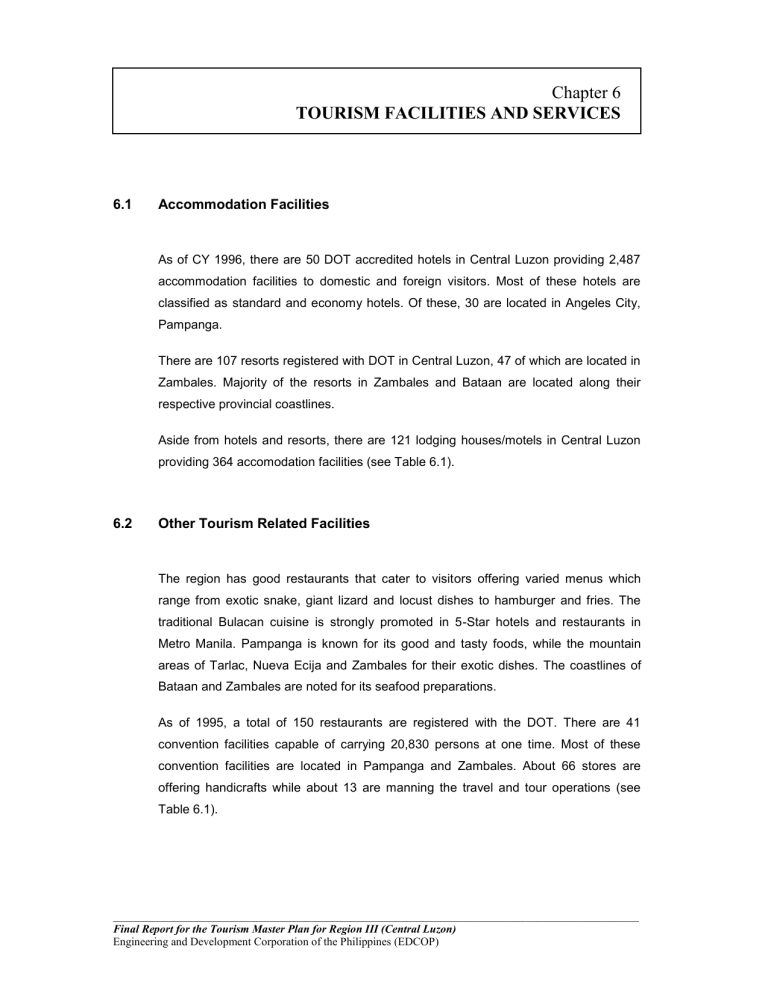
Chapter 6
TOURISM FACILITIES AND SERVICES
6.1 Accommodation Facilities
As of CY 1996, there are 50 DOT accredited hotels in Central Luzon providing 2,487 accommodation facilities to domestic and foreign visitors. Most of these hotels are classified as standard and economy hotels. Of these, 30 are located in Angeles City,
Pampanga.
There are 107 resorts registered with DOT in Central Luzon, 47 of which are located in
Zambales. Majority of the resorts in Zambales and Bataan are located along their respective provincial coastlines.
Aside from hotels and resorts, there are 121 lodging houses/motels in Central Luzon providing 364 accomodation facilities (see Table 6.1).
6.2 Other Tourism Related Facilities
The region has good restaurants that cater to visitors offering varied menus which range from exotic snake, giant lizard and locust dishes to hamburger and fries. The traditional Bulacan cuisine is strongly promoted in 5-Star hotels and restaurants in
Metro Manila. Pampanga is known for its good and tasty foods, while the mountain areas of Tarlac, Nueva Ecija and Zambales for their exotic dishes. The coastlines of
Bataan and Zambales are noted for its seafood preparations.
As of 1995, a total of 150 restaurants are registered with the DOT. There are 41 convention facilities capable of carrying 20,830 persons at one time. Most of these convention facilities are located in Pampanga and Zambales. About 66 stores are offering handicrafts while about 13 are manning the travel and tour operations (see
Table 6.1).
_____________________________________________________________________________________________
Final Report for the Tourism Master Plan for Region III (Central Luzon)
Engineering and Development Corporation of the Philippines (EDCOP)
6.3 Other Resources
Numerous beaches are abound in the Region, most of which are still undeveloped. Its coastline is suitable for water and marine sports.
Central Luzon also abounds in historical, cultural and religious attractions such as old
Spanish churches and cathedrals, festivals, monuments and museum with historical linkings. Several natural wonders are also found in Central Luzon such as waterfalls and volcanoes. The eruption of Mt. Pinatubo resulted in the formation of two lakes: one in San Marcelino, Zambales which is located atop a mountain and the Sacobia Lake in
Bgy. San Vicente, Bamban, in the province Tarlac.
6.4 Infrastructure
The Region is the host of two economic zones, namely: Clark and Subic Bay. It caters to industrialization, commercialization and the tourism industry.
6.4.1 Water Supply
About 81 municipalities are served by water districts out of a total of 122 municipalities/cities in the entire region. The share of households having access to
Level II and III is 40.38% for the entire region, with Bataan province leading its provision of these services against other provinces at an average of 55.7%. In terms of total share of households having access to all levels, the region enjoys a 94.18% share with Pampanga and Tarlac having the most number of households having access with a good record of 97.4 and 97.2, respectively (Table 6.2).
Level II and III provide water of acceptable standards. Over 80% of those served populations obtain water from wells. Mountain located barangays use rain water and surface water for domestic needs.
6.4.2 Sewage and Solid Waste Disposal
Most towns in Central Luzon do not have a comprehensive waste water disposal system. All rely on septic tanks and on pit privy system or the wrap and throw systems of discharging the human waste. Enforcement of proper waste disposal is minimally done by way of requiring applicants of new buildings to provide septic tanks as part of the building permit process.
_____________________________________________________________________________________________
Final Report for the Tourism Master Plan for Region III (Central Luzon)
Engineering and Development Corporation of the Philippines (EDCOP)
The use of septic tanks and the consequent treatment and proper disposal of effluent are still considered the most economical waste water disposal system for Central
Luzon. This is done either by using two or three cell septic tank with appropriately sized disposal fields, or on a system of sewer lines with water courses as disposal points. This system is mostly found in subdivision areas.
Methods in disposing solid wastes in Central Luzon are rudimentary. Open dump sites are commonly seen in urban municipalities and cities which are poorly managed and maintained. Table 6.3 classifies the households in Central Luzon in terms of garbage disposal methods they are accostumed to.
6.4.3 Communications
Succeeding discussions are referred to Table 6.4.
Postal Services
This type of service is mainly provided by the government. As of CY 1995, about 166 postal stations have been providing the mail needs of 122 municipalities/cities in the region compared to 163 postal facilities in 1991. On the average, about 41,759 persons are covered by one post office, more than twice the ideal ratio of 1:20,000 postal stationto-population ratio. Also, the letter carrier - distribution ratio is 1:6,448 which is below the standard ratio of 1:5000. However, despite these limitations, most municipalities receive their mail matters daily.
Telephone Services
Most of the telephone services are provided by private franchise operators such as
PLDT, DIGITEL and PILTEL. As of 1995, the region has a total capacity of 43,160 lines serving 54 municipalities/cities out of the total 122. With a population of
6,932,137 for year 1995, Central Luzon has a telephone density of 0.62 lines for every
100 people. Among the provinces, only Pampanga exceeded the regional status in providing this type of services.
Most of exchangers are interconnected to the public switched telephone network
(PSTN). Authorized public telecommunications carrier are now required to interconnect to PSTN to create a universally accessible and fully integrated nationwide telecommunications network. The PSTN is being used to carry non-voice services such as facsimile and switched data. Dial-up data service is connected in the same way and access to pocketswitched data network is often accomplished via dial-up facilities. Private lines carrying voice, telegraph and data services are available using the PSTN and record carrier infrastructure.
_____________________________________________________________________________________________
Final Report for the Tourism Master Plan for Region III (Central Luzon)
Engineering and Development Corporation of the Philippines (EDCOP)
On local exchange services, PLDT serves more than 90% of main stations. It also primarily operates the national long distance services since it has extensive nationwide backbone transmission networks. Other listed carriers are: TELOF, PT & T, RCPT,
DIGITEL which operate public long distance telephone calling booths in various parts of the country.
Cellular mobile telephone services are provided by PILTEL, Smart and EXTELCOM with nationwide coverage.
Telegraph Stations and Radio Telegraph Station
At present, there are 100 line telegraph stations and 114 radio telegraph stations servicing the 122 municipalities/cities of the region. This is an improvement of the situation in 1986 when the region had only 85 line and 33 radio telegraph stations. This improvement is a result of the government program of modernizing the telecommunication systems.
6.4.4 Power and Electrification
Power supply facilities in Central Luzon have a total generating capacity of about 703
MW accounting for 15.2% of Luzon grid capacity of 4,604.8 MW as of 1992. Peak load was estimated at 520 MW in 1992 accounting for 16% of Luzon grid at 3,250 MW.
About 50 percent of the region's generating capacity comes from hydroelectric power plants in Angat (Bulacan) and Pantabangan (Nueva Ecija) while the rest are contributed by the thermal and gas turbine power plants in Limay (Bataan). The gross power generation of the existing plants are registered at 1992 GWH (see Table 6.5).
1 /
This can sufficiently supply the requirements of the region.
Organization for the power supply system in Central Luzon consists of NPC for power generation, twelve electric cooperatives and private power utilities for power distribution (see Table 6.6). NPC is responsible for power generation and sales to electric cooperatives, utilities and big industrial consumers.
Since 1986, all municipalities in Central Luzon are enjoying electricity. At the barangay level, electrification coverage is estimated at 86.6 percent in 1992. Household coverage is placed at 81.3 percent (see Table 6.7).
___________________________
1 / In 1994, Angat, Pantabangan Hydroelectric plants and the thermal and gas turbine in Bataan have a plants' rated capacity of 1,228 MW already.
_____________________________________________________________________________________________
Final Report for the Tourism Master Plan for Region III (Central Luzon)
Engineering and Development Corporation of the Philippines (EDCOP)
Power program for Central Luzon includes the Bataan Nuclear plant. Should its conversion to a natural gas plant proceed as expected, this will add another 1,500
MW. The Casecnan Multipurpose Irrigation and Power Project is expected to increase
Pantabangan Dam's capacity by about 150 MW.
Also, transmission lines (TL) are being expanded to complement the power generating projects. Specifically, the Masinloc-Labrador 230KV TL project and San Manuel
(Pangasinan)-San Jose (Bulacan) projects are both expected to be finished in 1997.
The identified 114 mini-hydro sites are expected to contribute about 94MW and Mt.
Pinatubo and Mt. Natib in terms of geothermal power can contribute about 20 MW.
_____________________________________________________________________________________________
Final Report for the Tourism Master Plan for Region III (Central Luzon)
Engineering and Development Corporation of the Philippines (EDCOP)
Province
Bataan
Bulacan
Nueva Ecija
Pampanga
Angeles City
Clark
Mabalacat
Table 6.1
TOURISM RELATED ESTABLISHMENTS
Hotel
No. Room
Lodging Houses
No.
Resorts Restaurant
Room No. Room
DOT
Accredited
Others
1 22 1 3 1 29
Shopping/
Souvenir
Store
Travel/ Tour Operator
DOT
Accredited
Others
Convention
No.
Capacity
(persons)
Rest Roi
DC
Accre
- - - 6 1,050
-
2
-
80
22
5
66
15
3
15
79
150
1
-
26
13
12
13
1
-
7
-
2
3
1,300
1,371
-
7
1
- .
8
-
445
373
- .
818
11
2
-
1 .
29
291
63
-
50 .
404
7 70
- -
1 .
10 .
8 80
5
3
1
.
9
22
32
-
.
54
6
15
-
.
21
7
2
-
.
9
-
-
.
-
1
10
-
.
11
4,700
3,055
-
.
7,759
Tarlac 2 63 - - 4 40 25 - 10 - - 1
Zambales
Olongapo City
SBMA
-
2 185
2 .
569 .
5
- .
4
-
754
-
5
-
88
0 .
9 90
3 .
30 .
88
35
47
350
470
49
26
11 .
86
-
-
- .
-
-
-
10 .
10
-
3
- .
3
-
- .
6
10 .
-
2
18
2,030
3,060
4,260 .
9,350
576 78 889 150 93 66 13 7 41 20,830 Region 17 1,737 62
Source: Provincial Socio-Economic Profiles, 1995
Table 6.2
STATUS OF WATER SUPPLY SYSTEM 1 /
Province
Total No.of
Municipalities
No. of Municipalities served by water district
Share of Households having access to improved water supply (%)
Level II & III Level I, II & III
Bataan
Bulacan
Nueva Ecija
Pampanga
Tarlac
Zambales
12
24
32
22
18
14
9
21
20
13
10
8
55.7
48.5
25.2
41.2
23.9
47.8
91.4
93.0
95.7
97.4
97.2
90.4
Central Luzon 122 81 40.38
1 / Source: Master Plan Study for Central Luzon Development Program, 1995
94.18
Province
Bataan
Bulacan
Nueva Ecija
Pampanga
Tarlac
Zambales
Table 6.8
CLASSIFICATION OF HOUSEHOLDS BY USUAL MEANS OF GARBAGE DISPOSAL, 1990
Total
Household
Picked up by
Garbage
Truck
Dumping in
Individual Pit not burned
Burning
Composting
(Later Used) as Fertilizer
Burying
Feeding to
Animals
81,343 12,054 9,969 46,931 846 2,210 2,175
287,890
250,978
268,007
159,344
115,643
25,003
12,959
39,590
8,606
35,990
22,030
21,912
31,224
21,115
12,038
Region III 1,163,205 134,202 118,288
Source: 1990 Census of Population and Housing, National Statistics Office
219,839
199,526
168,218
111,527
56,464
802,505
3,362
4,701
5,335
5,117
1,704
21,065
7,114
8,862
12,282
6,200
4,976
41,644
4,049
2,065
5,247
5,194
3,671
22,401
Others
7,155
6,493
953
6,111
1,585
800
23,097
Table 6.9
STATUS OF COMMUNICATION 1/
Province
Bataan
Bulacan
Nueva Ecija
Pampanga
Tarlac
Zambales
Population
490,460
1,781,120
1,503,448
1,634,770
945,258
588,081
Postal
Station
Postal Service
Letter
Carrier (LC)
Ratio of
LC to Pop.
No. of
Municipality Served
Municipality
Telephone
Capacity
Lines
Density
Telegraph/Telex Radio Telegraph
Served
Mun
%
Served
Mun
%
18
30
39
35
23
21
66
267
211
330
124
77
1:7,431
1:6,671
1:7,125
1:4,954
1:7,623
1:7,637
12
24
32
22
18
14
6
21
5
9
10
3
2,296 0.47
8,655 0.49
2,287 0.15
21,389 1.31
4,503 0.48
4,030 0.68
9
19
26
21
14
11
75
79
81
95
77
78
11
23
28
21
17
14
91
95
87
95
94
100
122 54 43,160 0.62 100 82 114 93 Region 6,943,137 166 1,075
Source: NTL, 1995
1/ - Density: No. of Main Telephone Lines (per 100 persons)
1:6,448
Table 6.10
Plant
Hydro
Angat
Pantabangan
Angat Aux.
Masiwa
Oil
Bataan 1 & 2
Gas
Bataan GT
Total
Source: National Power Corporation
1 / Energy generation is already included in Angat P/S
POWER PLANT OF NPC IN CENTRAL LUZON
Capacity
(MW)
200
100
46
12
Power
Generation
GWH
345.94
174.90
1/
28.68
225
120
703
823.02
619.87
1992.41
Table 10.6
PROVINCIAL JURISDICTION OF POWER SUPPLY IN CENTRAL LUZON
Province Electric Cooperative Private Utilities/Other
Commissioning
Year
1967-1968
1977
1978-86
1981
1972-1977
1989
Bataan
Bulacan
Nueva Ecija
PENINSULA
MERALCO
NEECO-I & II, SAJELCO
PRESCO
CELCOR (Cabanatuan)
Pampanga
Tarlac
Zambales
PELCO - I, II & III
TARELCO - I & II
ZAMECO - I & II
Angeles Elec., SFELAPCO
Mason's
Tarlac Elec. Tarlac
Olongapo City Gov't.
Cooperative/
Utility
Peninsula (Bataan)
Meralco (Bulacan)
NEECO-I (N. Ecija)
NEECO-II (N. Ecija)
SAJELCO (N. Ecija)
PRESCO (N. Ecija)
Coverage
230
24
97
511
41
41
PELCO-I (Pampanga)
PELCO-II (Pampanga)
PELCO III (Pampanga)
113
171
99
TARELCO-I (Tarlac)
TARELCO-II (Tarlac)
412
119
ZAMECO-I (Zambales)
ZAMECO-II (Zambales)
118
112
TOTAL 2088
Source: National Electrification Administration and MERALCO
113
171
99
342
118
106
111
1809
Table 6.7
ELECTRIFICATION RATIO
Barangay
Energized
221
24
93
330
40
41
%
96.1
100
95.9
64.6
97.6
100
100
100
100
83
99.1
89.8
99.1
86.6
Coverage
72000
307131
Household Connections
Energized
59883
284464
42000
123000
14000
7000
37435
78846
10489
6831
40659
70825
41863
81000
42000
30000
35000
906478
31045
65715
33936
47435
32233
21256
27536
737104
76.3
92.8
81.1
58.6
76.7
70.9
78.7
81.3
%
83.1
92.6
89.1
64.1
74.9
97.6
